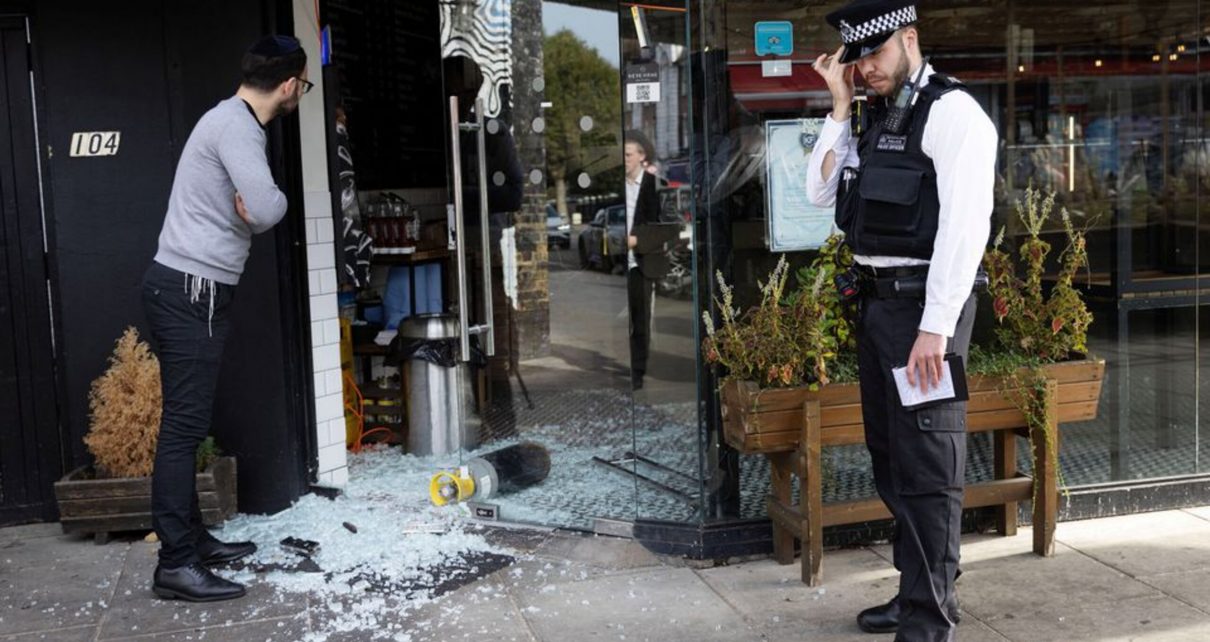In recent weeks, a surge in antisemitic incidents has raised alarm across the globe, with an intensification of verbal abuse, online slurs, threats, graffiti, defacement of Jewish properties, and physical assaults targeting Jewish individuals and communities. The rise in antisemitism follows the attack by Hamas gunmen on southern Israel on October 7 and the subsequent conflict between Israel and the Gaza Strip.
“These are troubling times for the Jewish community worldwide. We have faced challenges before, but the current situation is unprecedented in my lifetime,” said Anthony Adler, a community member, speaking outside a synagogue in London’s Golders Green, a neighbourhood with a sizable Jewish population.
Adler, who oversees three Jewish schools, was forced to temporarily close two of them due to concerns about potential attacks on pupils. He also bolstered security measures across all three schools, expressing his gravest fear: “The biggest fear is that there will be a random attack on our community, on our families, and our children.”
The surge in antisemitic incidents is not limited to a specific region but has a global footprint. In countries with available data from police or civil society groups, such as the United States, Britain, France, Germany, and South Africa, the numbers show a stark trend: antisemitic incidents have surged by several hundred per cent compared to the same period last year.
In several of these nations, Islamophobic incidents have also increased following the October 7 events, revealing a broader issue of rising tensions and discrimination amid the Middle East conflict.
The common thread in these antisemitic incidents is the connection to the ongoing conflict in Gaza. Anger over the deaths of Palestinians resulting from Israel’s actions has been used to justify aggression towards Jews in general, often accompanied by the use of historical slurs and tropes rooted in antisemitism.
“Regardless of their stance on the conflict, even those who strongly criticise the Israeli government view ‘Jew’ as synonymous with Israel, equating it with the killing of Palestinian children,” explained political scientist Nonna Mayer, a member of France’s independent human rights commission (CNCDH).
The intensity of the recent Gaza conflict, coupled with the trauma of the October 7 attack, has contributed to heightened fear within Jewish communities. Rabbi Alexander Boroda, president of Russia’s Federation of Jewish Communities, commented on the most chilling antisemitic incident globally, which occurred when an enraged crowd stormed an airport in Russia’s Dagestan region, seeking to harm Jews arriving from Tel Aviv.
In response, Boroda noted that anti-Israel sentiment had morphed into open aggression against Russian Jews. Shneor Segal, the chief Ashkenazi rabbi of Azerbaijan, highlighted the persistence of antisemitism, stating, “Antisemites will use any excuse, with the current Middle East crisis being just the latest, to terrorise the dwindling numbers of us that still remain” in the Caucasus.
Beyond the extreme incidents, a series of events globally underscore the anxieties and tensions affecting Jewish communities. Schools in Buenos Aires asked students not to wear their usual uniforms to reduce their visibility, while heightened security measures were introduced at institutions like Cornell University in upstate New York following online threats.
In Johannesburg, pro-Palestinian protesters targeted a Jewish community area, tearing pictures of Israeli hostages in Gaza from community centre walls during a Shabbat service at a nearby synagogue. Akiva Carr, a synagogue attendee, expressed his outrage, saying, “I feel rage towards the people who are trying to curtail my freedom of religion and my freedom of movement, primarily based on their antisemitism.”
Official responses to this surge in antisemitism have varied. In the United States and Western Europe, authorities have generally offered strong support for Jewish communities, denounced antisemitism, and reinforced security measures where necessary. Israel has urged citizens to reconsider the necessity of travelling abroad and advised vigilance during overseas stays.
However, in China, where the government often censors sensitive content on social media, there has been no indication of measures taken to address the torrents of antisemitic vitriol online. (REUTERS)


